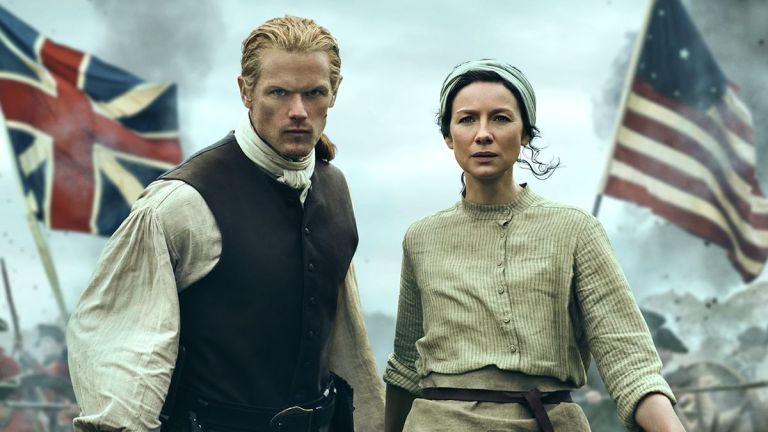Outlander: The Real Story Behind the Benedict Arnold Easter Egg
An unsettling appearance by Benedict Arnold in the mid-season seven finale of Outlander inspires questions of fate and traitors.

This article contains spoilers
Outlander season seven’s midseason finale featured the Battles of Saratoga through the eyes of Jamie and Claire on the American side and William Ransom on the British side. The episode shows the British forces surrendering after the Americans overwhelmed British fortifications.
Although several famous Revolutionary figures have been both name-checked and featured in this season, Benedict Arnold is arguably one of the most interesting of them all. Arnold is introduced as a very friendly man and a key strategist in the plan to defeat the British. Claire mentions to Jamie that history only remembers him for betraying the American cause. How close is Claire’s fictional assessment to real history?
Arnold’s involvement in the Revolutionary War on the American side began when he was elected to captain in the Connecticut militia in March 1775. This overlaps with the events of last season. It was Arnold’s idea to seize Fort Ticonderoga initially for the Americans because he knew the British defense was poorly staffed. He accomplished this in May 1775.
After Ticonderoga, Arnold was slighted with promotion and he was now subordinate to Colonel Benjamin Hinman who led the reinforcements who were sent to the fort. Arnold resigned from his post and went back home to Connecticut. Two of Hinman’s subordinates also began to circulate rumors of Arnold’s negative behavior which decreased his popularity with senior leaders.
After seizing Fort Ticonderoga, he approached the Continental Congress with a plan to invade Quebec. Arnold also believed that the colony was poorly defended. He was passed over to lead the initial assault on British defenses but was later put in charge of the troops attacking Quebec from Western Maine’s forests. Arnold successfully captured Montreal in November 1775 but failed to capture Quebec City. He was wounded in the leg but continued in the field to support his troops. Daniel Morgan, Jamie’s future commanding officer, and his riflemen were also involved in the siege.
Arnold spent the majority of 1776 participating in various battles in Canada and also played a huge role in defeating General Tryon’s forces in Rhode Island and Connecticut. While he was gaining a reputation for bravery he was also making enemies as Arnold believed the same people responsible for his sidelining were undermining his ability to become a Major General. He also visited his family and sought treatment for his wounds.
The episode “A Practical Guide For First Time Travelers” features the Battle of Freeman’s Farm. Outlander’s title card names it the First Battle of Saratoga which is also correct. It depicts Jamie and the rest of Morgan’s riflemen cutting down the British forces that were out in the open. Arnold’s role in the battle was not mentioned which may be a purposeful nod to the conflicting historical accounts about his actions. One of the Arnold biographers claims Arnold led men to attack British fortifications before Gates ordered him to stop while others claim he sat out the battle.
Claire meets Arnold in “Turning Points”, before the Second Battle of Saratoga (also called The Battle of Bemis Heights) and before the Americans attack British troops. She’s surprised at his gentlemanly demeanor because he’s not the villain and traitor everyone in the 20th Century knows him as.
During the Second Battle, Arnold led troops which attacked the right flank of the British forces. Historians are also in disagreement on whether Arnold took the initiative on his own which would indicate being motivated by spite or whether General Gates assigned him to the right flank. A letter from an eyewitness uncovered in 2016 shows Arnold’s desire to mess with the British forces was officially sanctioned. Much of what was documented about Arnold’s actions during Saratoga was from after the treachery Claire mentioned to Jamie will happen in the future.
So, what led Arnold to switch sides? Well, Arnold was severely injured during the Second Battle and Gates could not ignore how key Arnold’s troops were to General Fraser’s death and securing the British surrender. His rank was restored but he was reassigned away from active battle duty because of his injuries. Arnold moved to Philadelphia in June 1778 in charge of the troops who took Philadelphia, and he was in a position to gain financially from overseeing supply contracts and other business affairs. He was also in close contact with known Loyalist residents in Philadelphia.
Arnold even married a Loyalist. Between the perceived slights by Gates and others and his new Loyalist friends arguing that the British would eventually win is what ultimately led to Arnold switching sides. In May 1779 he secretly contacted the British command and asked for cash in exchange for setting himself up in a position where he could expose American battle strategies. Unfortunately, Arnold’s British contact was arrested and hanged by the Americans while Arnold escaped. From that point on, Arnold became the traitor we all know from history class.
Will Jamie and Claire meet General Benedict Arnold again? Will there be other famous American figures mentioned or featured? We’ll have to wait until the second half of season seven of Outlander returns in early 2024.
